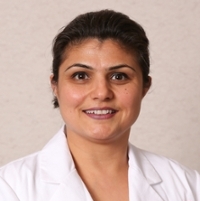Professor, Ohio State University; Former Postdoc, Department of Neurosurgery; 1999-2002

Interview By Caelin Potts, PhD
Postdoctoral Fellow, Dept. of Biology
Dr. Balveen Kaur is a professor at The Ohio State University (OSU) in the Department of Neurological Surgery and serves in many other capacities at OSU including but not limited to the co-director of the Office of Postdoctoral Research. Dr. Kaur began her scientific career driven by her curiosity and desire to learn new things. She obtained her bachelor’s degree in Physics from the Delhi University and a master’s degree in Biotechnology at Banaras Hindu University. At Emory University, she obtained her PhD in the laboratory of Dr. Paul W. Doetsch studying DNA damage repair in yeast. She then transitioned into translational research by joining the laboratory of Dr. Erwin G. Van Meir’s in the Department of Neurosurgery to study tumor development and angiogenesis. In 2005, Dr. Kaur joined OSU as an assistant professor, where she has earned multiple awards for her teaching and mentorship, earning a full professorship in 2013. Dr. Kaur graciously took some time out of her busy schedule to discuss her experiences with me.
Can you briefly describe the size and mentorship style of your laboratory?
My laboratory is typically composed of 10-12 people. This includes graduate students, postdoctoral fellows, undergraduate students and one senior scientist. I vary the way I mentor each individual to help him or her be as productive as possible. This model of mentorship serves two purposes. First it helps each student achieve his or her maximum potential and additionally, it keeps the global objectives of the laboratory moving forward.
Do you have teaching responsibilities?
Overall, I have a light teaching load. I typically teach a couple of graduate courses each year and have also taught a specialty seminar course for a small group of undergraduate students.
Were there any specific resources that at Emory such as the Office of Postdoctoral Education that you utilized to help you transition into an independent position?
I attended some seminars and career workshops that provided practical and helpful skills. However, I did not take advantage of opportunities to learn how to be an effective interviewer. When I started searching for an independent position, I received many interviews but had trouble getting beyond the interviewing stage. A good publication record is absolutely required for obtaining a first interview call, but having some of the softer skills can really serve as the icing on the cake and provide a smoother transition.
You have served on many NIH study sections. Do you have any advice for postdocs about grant writing and successfully obtaining funding?
Scientific writing is essential to a successful career. A scientific grant is essentially your elevator speech, where you must briefly sell or promote your ideas. I require each of my students and postdocs to write and submit a grant because this is a wonderful learning experience. Applying for grants is more involved than simply submitting a scientific idea and going through a submission is a great way to learn this. I recommend partnering with a colleague other than your principle investigator who has successfully submitted a grant. Have this colleague read and critique your grant at least a month before the due date. You will need that extra time to really think about the comments and incorporate suggestions in a meaningful way.
You provide editorial services for the Molecular Therapy Oncolytics journal. Can you tell me about the time commitment and responsibilities this entails?
As a member of the editorial board, you receive a subset of all the articles submitted to that journal and have to make the decision if the article is qualified to be sent out for peer review. If the article is acceptable for review, you must select three individuals in the field to judge the merit of the scientific work and then organize all of the logistics to ensure the review is completed in an acceptable amount of time. If the journal has a low rate of acceptance, this will increase the time commitment because you will be receiving and reviewing more papers.
You have multiple patents and inventions. Can you tell me about the process of filing patents as an academic faculty member?
For scientific discoveries that can have a direct translational impact, obtaining ownership of the idea or discovery is very important. A lot of investors including the NIH will favor investment in patented ideas for future development. When you have an idea that you believe is patent worthy, you contact the technology licensing office within your university. An internal review of your idea will be conducted to verify that it is truly novel and has not been previously documented. In addition, an evaluation of the expected value of the patent will usually be conducted to determine if the potential financial gain is sufficient to invest in the patent filing process. If the idea successfully passes through these internal reviews, the university will begin the process of filling for a patent.
From our conversation, it’s clear that your job entails far more than simply managing a research lab and teaching, how do you manage so many distinct obligations?
An academic career continuously builds on itself. When you get started, you don’t have many responsibilities beyond your own laboratory and teaching commitments. Once you master these components, you pick up new responsibilities, which helps keep the job challenging and interesting.
Do you have any advice for postdocs making the transition to an independent career?
During your postdoc, your main focus is perfecting your science. When you transition to an assistant professor, your main priority is now management, which everyone must learn on the job. You go from being a team member in an established laboratory to being all by yourself in an office. Don’t be afraid to reach out to your new peers for help with this transition. Knock on office doors and seek out resources. You will find them.
This interview was published in July 2015.

